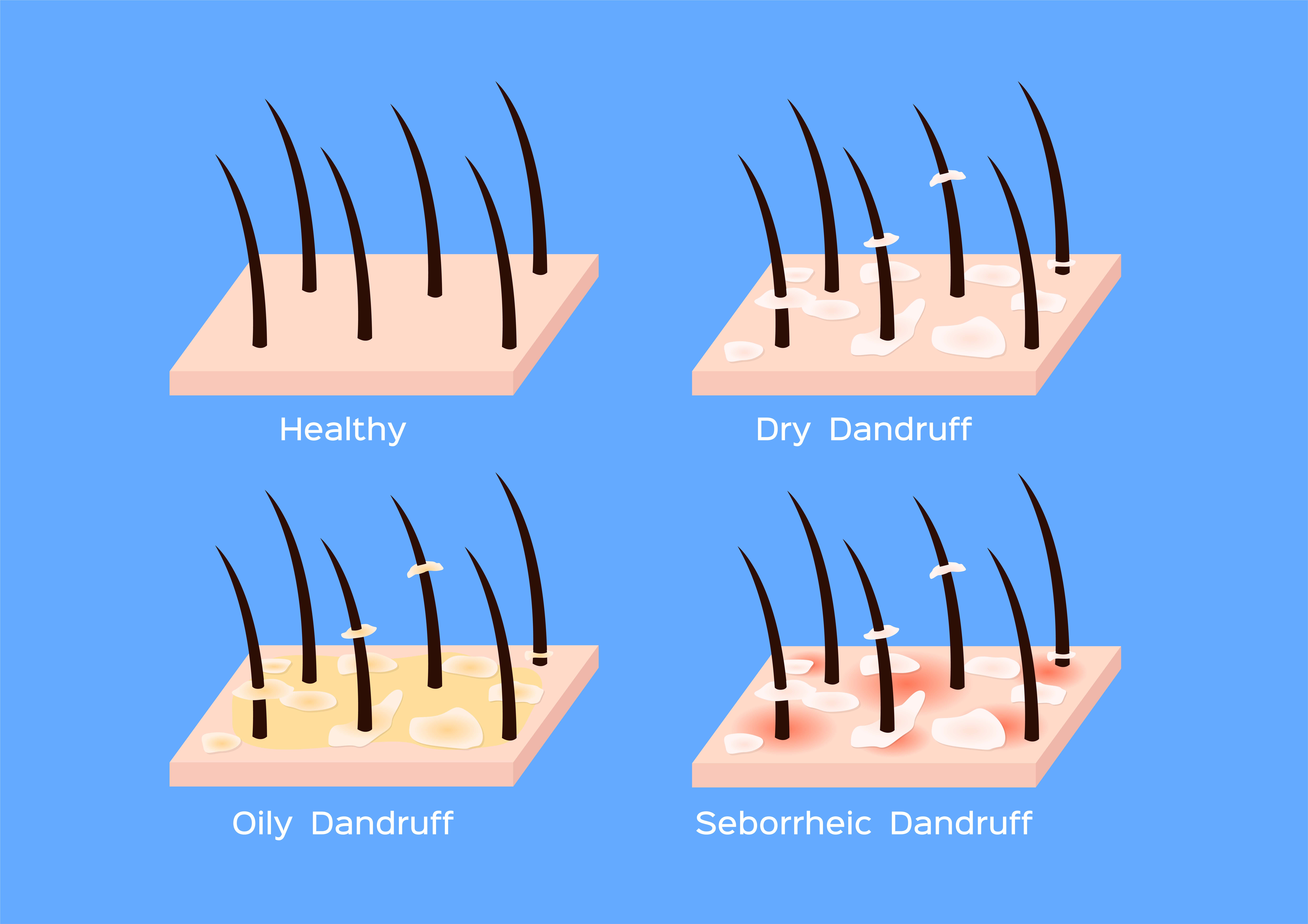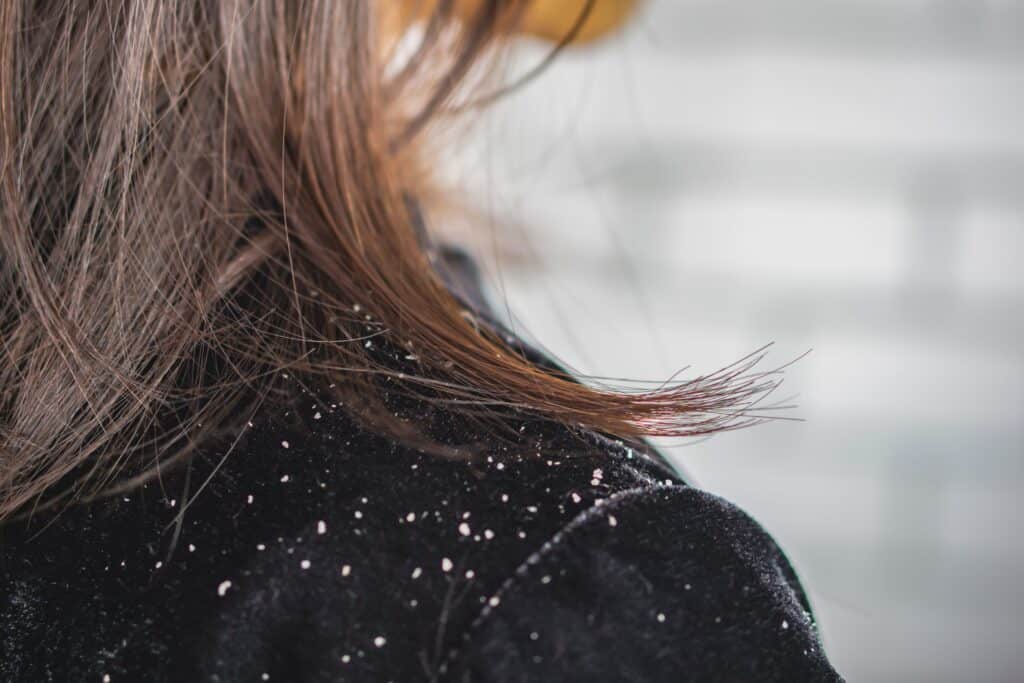What is Dandruff?

Dandruff is a scalp condition. It causes excessive sebum production and white to yellowish flaky skin on the scalp. Dandruff has a 50% prevalence rate. However, the incidence rate decreases the older you get. It’s not serious or contagious.
But you should not leave it untreated. Indeed, dandruff can become very inflamed and cause hair loss. The common symptoms of dandruff may include itchy scalp, flaky skin, reddish spots, and hair loss.
What Can Cause Dandruff?
Scalp conditions that cause flaky skin may cause dandruff. Here are the most common causes:
Seborrheic Dermatitis
Malassezia yeast overgrowth can cause inflammatory reactions, which may lead to seborrheic dermatitis. Seborrheic dermatitis is an inflammatory skin condition of the scalp. It causes a red or grayish itchy and scaly rash. Untreated, your hair follicles might be damaged.
Fungal Infections
Excess malassezia can cause an immune system overreaction, leading to fungal infection and skin changes. Fungal infections can cause dry flakes or blisters on the scalp.
Scalp Psoriasis
Psoriasis is one of the chronic skin conditions that primarily affects the skin and sometimes the scalp. It causes itchy, scaly patches. One of its side effects is that hairs may stop growing along those patches.
Lichen Planopilaris
Lichen planopilaris can lead to a dry, flaky rash on the scalp. One of the main effects of Lichen planopilaris is dandruff.
Can Dandruff Cause Hair Loss?
Can dandruff cause hair loss? Dandruff itself does not directly cause hair loss. However, some underlying conditions leading to dandruff can cause hair thinning.
For example, seborrheic dermatitis is an underlying cause of dandruff. Seborrheic dermatitis can cause hair loss and hair thinning. There is flaky skin, itching, and inflammation from increased sebum production. It can lead to damaged hair follicles. The damage to the follicles can lead to hair shedding and obstruct natural hair growth.
A malassezia overproduction may also weaken the hair root and lead to hair shedding. Seborrheic dermatitis causes aren’t fully understood. Some common triggers may include:
- Weakened immune system
- Certain medications
- Genetics
- Having a weakened immune system
- Alcohol use
- Human immunodeficiency virus (HIV)
- Chronic stress
Malassezia can cause oxidative damage. Oxidative stress can also cause premature hair loss. Another study stated that irritation due to pollution can cause excess sebum production. It could lead to hair loss.
How Can You Prevent Dandruff Hair Loss and Dry Scalp?
Dandruff prevention starts with treatment of the underlying condition. Some strategies may include:
Check Up
A white, flaky scalp, along with hair loss, is indicative of various underlying issues. You should check in with a healthcare provider to figure out the underlying cause. You can book a consultation with Cosmedica for advice and treatments.
Avoid Harsh Chemicals
Some hair products contain harsh chemicals. These can irritate and dry out your scalp, leading to worsening dandruff symptoms.
Keep Your Scalp Moisturized
Dryness can lead to whitish dandruff. Washing your hair with lightweight moisturizing shampoo or hair mask can help with this issue.
Dandruff Shampoo
Medicated shampoo can be a great way to combat dandruff. Medicated or anti-dandruff shampoo, in some cases with antifungal properties, may contain the following active ingredients:
- Selenium sulfide
- Ketoconazole (Nizoral 1%)
- Salicylic acid (Neutrogena’s T/Sal Therapeutic Shampoo)
- Zinc pyrithione
If you are using tar-based dandruff shampoo, please take some precautions. Do not use it on colored hair, and always wear a hat outside.
How Do Dandruff and Scalp Health Affect Hair Loss?

Hair follicles can thrive in a healthy scalp. However, poor scalp health can lead to reduced hair growth and eventual hair loss.
Inflammation
Psoriasis, dandruff, and other conditions can cause inflammation of the scalp. Chronic inflammation can weaken the hair follicles.
Balance of Oil
Excessive sebum or oil production can clog hair follicles and provide an optimal environment for fungus to thrive. Conversely, decreased oil production leads to a dry and flaky scalp.
Microbial Balance
Our scalp is home to a variety of microorganisms. An imbalance can irritate and damage the hair follicles.
How to Recover from Dandruff Hair Loss?
Once you treat dandruff, hair typically regrows. However, it is important not to scratch your scalp. If you feel like your hair loss is severe and permanent, you can consider mesotherapy or hair transplants.
Mesotherapy
Mesotherapy involves introducing derma rolling for improved blood circulation. It helps to deliver essential nutrients to treat hair follicles and stimulate hair growth.
Hair Transplants
A hair transplant is a permanent, minimally invasive procedure to restore the hairline. Under world-renowned surgeon Dr. Levant Acar, Cosmedica has a 98% growth rate following its innovative DHI Sapphire method. You can look at their before-and-after gallery to see images of restored hairlines.
Summary
So, can dandruff cause hair loss? In short, yes. In the most severe cases, dandruff can cause hair loss due to the inflammation of the scalp. There are also other physiological conditions behind the white, flaky condition of your scalp.
It is very important to understand and educate yourself about the reason for your scalp condition. Whether it is fungal, viral, or environmental, treatment of the underlying cause is always the best course for hair regrowth. If you are considering a hair transplant for your hair loss, you can investigate affordable, state-of-the-art clinics in Turkey as well.
